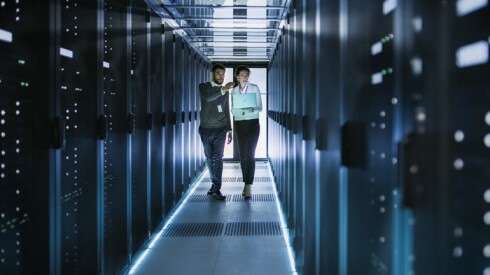-
As generative artificial intelligence develops, new terms and emerging threats are grabbing headlines regarding cyber threats to enterprises.
-
The nonprofit National Writing Project and online writing platform NoRedInk are starting an online information-sharing community and offering free webinars for educators on the impact of AI on writing instruction.
-
An exec at Duquesne Light Co., which provides electricity to the city, cautioned state public utility commissioners that data centers’ “extreme energy demands” could cost other customers.
More Stories
-
A law signed Wednesday by Gov. Kelly Armstrong looks to reform the “prior authorization” process for patients. It sets deadlines for that process to be made by a doctor, not AI or insurance companies.
-
The State Bar has petitioned the court to adjust hundreds of test scores due to technical problems, and the court is demanding answers from the State Bar about how and why it used AI to develop exam questions.
-
Education leaders said the order creates important momentum, but they expressed concerns about sustainable funding and whether ed-tech leaders will have a seat at the table to help shape the directive’s initiatives.
-
The State Bar of California stirred some controversy when it disclosed that some questions on this year's exam were developed with the assistance of AI by ACS Ventures, the State Bar's independent psychometrician.
-
Money from the Oregon CHIPS Act, a package of legislation from 2023, will help Oregon colleges and universities hire artificial intelligence faculty and technical experts.
-
The university's pilot program, which will use virtual teaching assistants to explain course concepts to students and guide them through problems, will contribute to a study on virtual TAs working across 26 campuses.
-
The $11 billion data center campus going up outside of Northwest Indiana will have a 2,250-megawatt capacity. It will be able to use as much electricity as 1.5 million households, or up to half the households in the state.
-
The proposed legislation, a bipartisan proposal, would create a certification system offering tax incentives to entities that build data centers. Critics worry about lost revenue and power demands.
-
The government technology heavyweight has bought ePermitHub. That company’s technology will help Accela customers further streamline and automate public agency permitting tasks, including via the use of AI.
-
The technology of refrigeration changed not just what and how we eat, but also the economy, international trade and even the atmosphere. When educators teach students about AI, they need to think beyond computers.
-
A new Communications and Technology Committee in the House will play a part in reviewing most artificial intelligence-related proposals. Legislators have set a series of policy hearings in which to hear from AI leaders.
-
The company’s newest device for law enforcement combines body camera technology with a microphone that can record different vocal tracks. A company executive explains the appeal of the new AI-backed offering.
-
Officials in the Garden State have unveiled two new artificial intelligence initiatives, the Next New Jersey Program — AI and the AI Innovation Challenge Administration Grant Program. Both encourage private-sector investment.
-
A nonprofit research organization is working with Florida Virtual School and the University of Florida to offer middle and high school students a certification for learning about how AI concepts intersect with math.
-
A joint venture between several universities, the Massachusetts Green High Performance Computing Center is building computing capacity with investments expected to top $100 million over the next five years.
-
In a five-year partnership with the biomedical research company Leidos Inc., the university will develop artificial intelligence-powered tools to diagnose and treat ailments such as heart disease and cancer.
-
The Montgomery County, Pa., council aims to bring up to 15 people with experience in different sectors together to aid the county’s usage of artificial intelligence in an ethical and responsible fashion.
-
The vice president for digital innovation at the American Association of Colleges and Universities says AI discussions and assignments are essential for preparing students to be competitive in the working world.





























